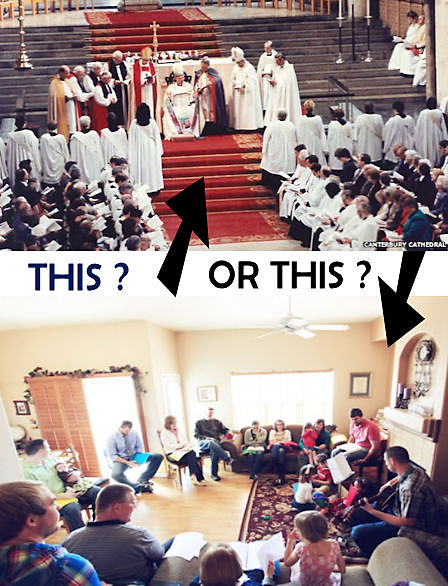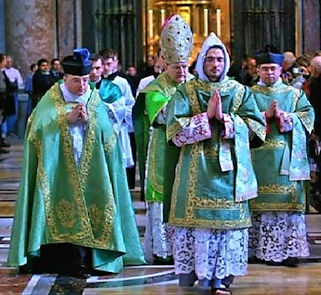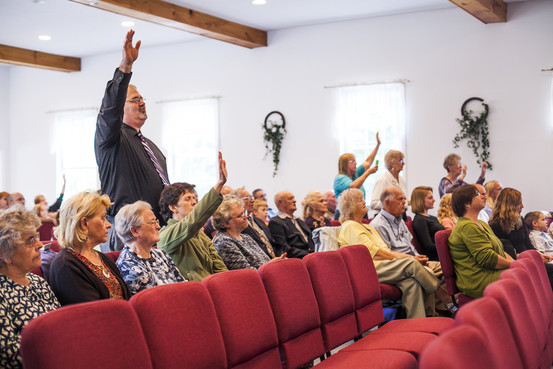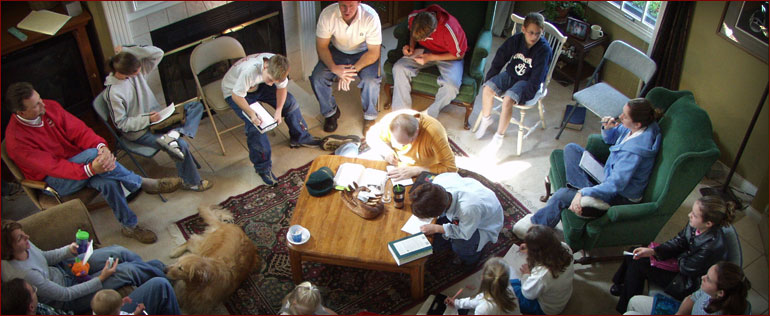Articles
"The Biblical Church" by Tricia Tillin
Is it time to reform our churches according to the bible?

We are bible-believers who value above all the instruction of the Lord - right? We reject the ways of the world and use the bible to find out about everything that pertains to our faith and behaviour - right?
So, isn't it rather astounding that in the most basic instruction of all, we completely ignore what the bible says?
I'm talking about Church. There IS a biblical church blueprint, but for the most part we Christians have built something else. In many cases Christians do not even perceive there could be another way! In this brief article I am going to look at some common practises and examine them in light of the bible. They include:
- Leadership
- Ordination and Priests
- Ceremonies and Buildings
- Immaturity and Dependence
- Worship
- Spiritual Gifts and Ministries
- Discipline and Abuses
NOTE: If you have questions, a few are answered below HERE
History Led Us Astray
For centuries the idea of a single ordained/anointed leader, set forms of worship, special church buildings, ritualised ceremonies and now - celebrity preachers and entertainment worship - have displaced the true intentions of God in the Body of Christ.
Almost everything people think of as "church" is in fact not from the bible but from man's own ideas, desires and traditions! And not only the "oldstyle" traditional churches with their rows of silent parishioners looking towards the front altar where the Priest/Vicar/Pastor does and says everything; but the breakaway newer fellowships where anything goes so long as it still brings attention to the 'anointed leadership'; both are equally mistaken in their construction.
While the man in charge (or sometimes woman!) is the focus of attention, that church is disobeying the commands of God. We disobey Jesus who said "...do not be called Rabbi; for One is your Teacher, and you are all brothers". Matt 23:8

Give Us A King
It was a disobedient people who demanded a king!
God's chosen nation, Israel, envied the organisation of the nations around them. The prophet Samuel warned them exactly what would happen if man took charge instead of God: a king would oppress and use the people, demand special favours, take their property, and set up a pyramid structure of rulership in which brotherhood was lost and the king's laws were cruelly enforced. But...
"...the people refused to listen to the voice of Samuel, and they said, "No, but there shall be a king over us, that we also may be like all the nations, that our king may judge us and go out before us and fight our battles"." 1 Samuel 8:19-20
What was the reason? The same reason Jesus warned his disciples not to set up authoritarian structures with special leaders - human nature divides very neatly into two types of character, the submissive and the dominant.
The Chalk and Cheese of Human Nature
In ANY organisation no matter what it is, however carefully structured and however well-meaning at the beginning, two opposite human characteristics will assert themselves. The dominant person (feeling himself more capable) will seek popularity, leadership, preference, control and acclaim. The submissive (or simply lazy) will prefer to be led rather than have to do something for themselves. For the naturally submissive and timid personality, it's less risky, and for the lazy it's less arduous and time-consuming.
It is a fact of life that people feel more secure when they have someone more capable or knowledgeable in command. They will defer to anybody who knows - or even seems to know - more than they do. They then actually rejoice when a leader steps up to the mark to take over.
So it was with Israel, and so it has been with the churches. Overlooking the warning Jesus gave, almost from day one the brotherhood fractured into the leaders and the led, clergy and laity, members and pastors.
Proper Eldership
To avoid misunderstanding let me say, eldership and oversight is good and needful. The Church should have teachers, pastors and other ministers. The bible does encourage eldership, but never in the context of [domineering] RULE, only of SHEPHERDING the flock, leading it to pasture and keeping it from wolves.
When Jesus heard two of his disciples disputing who of them should be the greatest in the coming kingdom, he warned them about human pride:
Jesus called them to Himself and said, "You know that the rulers of the Gentiles lord it over them, and their great men exercise authority over them. It is not this way among you, but whoever wishes to become great among you shall be your servant, just as the Son of Man did not come to be served, but to serve, and to give His life a ransom for many." [Matthew 20:25-28]
I believe that the instruction to have more than one person in leadership is another guard against error. It stops the church elevating one heroic person to spiritual godhood, and relegating everyone else to mere fans who sit at his feet - some modern churches have made that their model and created movie stars out of their leaders, who supposedly can do no wrong.
Having more than one elder has other benefits:
- It creates a community where there is consultation and wise counsel over important decisions.
- It spreads the work of running the church so that one man doesn't get burnt out.
- It prevents one leader bringing in destructive heresy and forcing it upon everyone else.
- It guards against constant praise and adulation going to one person's head.
- It keeps all the elders humble because they know they have to defer to one another.
- It prevents the church members becoming fixated and dependent upon one person.
Plurality of Elders
From https://electexiles.wordpress.com/2008/03/19/how-should-our-churches-be-led-13/
First, we should note that the church or churches in Jerusalem had elders (Acts 11:30; 15:2, 4, 6, 22-23; 16:4; 21:18). Acts 14:23 indicates that Paul and Barnabas appointed elders in all the churches they visited on Paul’s first missionary journey. Further 1 Timothy 5:17 indicates that the church at Ephesus had a plural leadership model and in Titus 1:5 Paul commands Titus to appoint elders in the churches of Crete.
1 Peter gives some of the strongest evidence for the presence of plural eldership in the New Testament churches. Peter’s first epistle is addressed to churches in “Pontus, Galatia, Cappadocia, Asia, and Bithynia.” We don’t know exactly how many churches the epistle of 1 Peter was circulated to, but it was likely at least dozens, possibly even hundreds or thousands of churches in Asia Minor. Peter challenges “the elders” of these churches to “shepherd the flock of God among them.” Thus we can deduce from this that plural eldership was the pattern for all of the many churches that Peter’s letter is addressed to. Further, it should be noted that there is no verse in the NT that describes one person as the single elder of a church. Although the New Testament’s teaching on elders is generally directed at churches in general, Philippians 1:1 is directed to a specific church and the model for leadership is clearly one of a plurality of elders.
Where Single Rulership Has Led
It probably doesn't need me to tell you that one of the most corrosive elements of the traditional ecclesiastical system over the years has been the so-called "priesthood" starting with men disobeying the command not to be called "rabbi" and ending with a complete hierarchy of leaders right up to the Pope.
The problem with the priesthood is that we no longer need a priest who stands between us and God, who alone reads the bible text and explains what it means, and who performs set prayers and special rituals on behalf of his congregation. That was the OLD order, not the NEW.
Are New Testament leaders "priests", just as they were in the Old Testament? No! Read the below article [source] for a more full explanation:
1. There’s a Difference Between “Presbyter” and “Priest”
According to the Catholic Encyclopedia, the word “priest” has its etymology in the word, “presbyteros.” It may be possible that there are etymological connections between these two words, but the argument that “priest” and “presbyter” are essentially the same word and refer to the same office in the church is simply untrue and misleading.
In the New Testament, we find the word “presbyteros” or “presbyter” over 60 times (see Acts 14:23; 20:17; 1 Tim. 5:17). This word simply means “elder” or an older man. The “elders” or “presbyters” of the first-century church were older and mature Christians who were appointed to oversee and shepherd the congregation (see Titus 1 and 1 Timothy 3). There were a plurality of them in every congregation and they never acted as intermediaries between God and the church.
The Greek New Testament word for priest is, “hiereus” and it appears over 30 times in the New Testament (see Matt. 8:4; Acts 4:1; Heb. 7:1). This is the Greek word for a man who acts as an intermediary between God and man. But an elder (presbyter) in the church was never called a priest (hiereus). In other words, these two words are neither related nor used synonymously in the New Testament.
2. Who are Called “Priests” in the New Testament?
As stated earlier, in the pages of the New Testament you can find the word “priest” over 30 times. But there is never a time when the word “priest” is applied to a person holding a distinct office in the church. Here are the people to whom this word is applied:
- Levitical Priests – Levites descended from Aaron (the brother of Moses) who were appointed to serve in the temple under the Old Testament Law (see Matthew 12:4-5; Luke 5:14; Acts 4:1).
- Pagan Priests – Idol worshippers who acted as intermediaries between Gentile people and their mythological pagan deities (see Acts 14:13).
- Melchizedek – A priest in the Old Testament who was a foreshadow of Jesus Christ (see Hebrews 5-7).
- Jesus – Jesus is called our “High Priest” (see Hebrews 2:17; 3:1; 4:14; 5:1-10; 5:20). He is the one who serves as our sole intermediary.
- All Christians – Peter wrote that all Christians make up a “royal priesthood” (1 Peter 2:9) and the apostle John wrote that all Christians have been freed from sin and made to “priests” (Revelation 1:6-7). Not in the sense that Christians are intermediaries between God and others, but that Christians have access to God through Jesus Christ.
3. Why is This a Big Deal?
This issue is huge. And while some might be offended that I have dared tread this traditional ground, people need to know and understand the truth. The idea of ordaining select people as priests comes from the Old Testament and paganism, but not from Christianity.
When any man (or woman) stands as a priest between God and man, he puts himself in Christ’s seat and that is the height of hubris. Jesus Christ is the only one who comes between God and man. He is our only mediator. “For there is one God, and there is one mediator between God and men, the man Christ Jesus” (1 Timothy 2:5).
And for a select group to claim the exclusive rights of “priesthood” is to deny the New Testament’s clear instructions that all Christians make up the Christian priesthood. “To him who loves us and has freed us from our sins by his blood and made us a kingdom, priests to his God and Father, to him be glory and dominion forever and ever. Amen” (Revelation 1:5a-6).
Everyone who has obeyed the Gospel of Jesus Christ is a priest, and as priests, we are expected to “continually offer up a sacrifice of praise” and service to God through Christ (Hebrews 13:15-16). So let’s stop giving reverence to those who are essentially usurping Christ’s position as mediator. Let’s stop calling them “father” as a title of reverence, for that title belongs to God alone (see Matthew 23:9). And let us simply respect the High Priesthood of Christ and obey His Gospel, so we can “with confidence draw near to the throne of grace” (Hebrews 4:16) as a “royal priesthood” (1 Peter 2:9).
Also see: Five Solas "The Problems With Traditional Ordination"
From the above link we see that the concept of formal ordination to the leadership of a church is also not biblical, since men (and indeed women in their own roles) are called to a certain life's work by God, who ordains and appoints by his Holy Spirit, and provides ministry gifts accordingly. These things can never be learned independently of God, nor "imparted" by others.
Furthermore, ordination as practised today creates an artificial division of the Church into "clergy" and "laity". It also promotes the idea of priesthood, and encourages church members to be lazy and immature, constantly being spoon-fed on spiritual babyfood, incapable of thinking or acting under the anointing of the Holy Spirit for themselves.
Who is in Charge?
God says that it's his Holy Spirit who instructs and teaches us ALL. That is, not just a few special leaders. (John 16:13 and 1 Corinthians 2:9-11) Why then are so many church members dependent upon human beings for their instruction?
I believe it's because the system and the structure create that environment. 
People are essentially lazy, and given the choice to sit back and do little they will jump at the chance. Christians who are not daily encouraged - expected - to seek out the truth for themselves, to pray, to worship, and to exercise the gifts of the Spirit in their own walk with the Lord, are apt to fall back into a soft and dependent way of life where the Pastor does everything for them.
- Man-led churches and organisations shine the light of glory onto a human being instead of God, and that is where it all goes wrong. Men are flawed, only God is perfect.
- Man's only real task in ministry is to draw attention to GOD, and to deflect all human adulation. Indeed, the more fearful a man or woman is of becoming some kind of idol, the better.
The Example Jesus Gave
Jesus knew the heart of humanity. He knew what drives us, and what causes us to fall. He understood the human need to dominate and control.
Again, the devil took him to a very high mountain and showed him all the kingdoms of the world and their splendour. “All this I will give you,” he said, “if you will bow down and worship me.” Jesus said to him, “Away from me, Satan! For it is written: ‘Worship the Lord your God, and serve him only'.’” Matthew 4:8-10
In his response to the devil, “Worship the Lord your God, and serve him only” Jesus directed all leadership and rulership back to the divine Head. He hit upon a very basic desire in mankind, to rule and govern others by coercion. Even from a benign and worthy motive, this desire is still wrong. (Hence his command to his disciples to be humble servants, not overlords.)
Ask The Oracle!
How many people today are running to their Pastor, or favourite Bible Teacher, or Internet Guru, to find out the answers to their spiritual questions?
And I, brethren, could not speak to you as to spiritual men, but as to men of flesh, as to babes in Christ. I gave you milk to drink, not solid food; for you were not yet able to receive it. Indeed, even now you are not yet able, for you are still fleshly. (1 Corinthians 3:1–3)
While teaching is necessary, and some will always be more mature than others, it was God's intention that we all "grow up and become mature" in our understanding rather than stay forever as babies needing to be fed soft food. We all as spiritual adults need to seek, pray, study, research and meditate on the truths of God to find out what we need to know.
...until we all attain to the unity of the faith, and of the knowledge of the Son of God, to a mature man, to the measure of the stature which belongs to the fullness of Christ. As a result, we are no longer to be children, tossed here and there by waves and carried about by every wind of doctrine, by the trickery of men, by craftiness in deceitful scheming; but speaking the truth in love, we are to grow up in all aspects into Him who is the head, even Christ. Ephesians 4:13-15
-
Here's a handy checklist to see if you are still a spiritual baby
-
Here's my own article on becoming a mature believer
Genuine Worship
In the bible and the early church, there was corporate worship. Every member contributed in songs, psalms, hymns of praise and enthusiastic melody-making as an act of worship to God. They certainly didn't gather together to listen to a musical performance nor to be entertained.
“And do not get drunk with wine, for that is debauchery, but be filled with the Spirit, addressing one another in psalms and hymns and spiritual songs, singing and making melody to the Lord with your heart, giving thanks always and for everything to God the Father in the name of our Lord Jesus Christ, submitting to one another out of reverence for Christ.” Ephesians 5:18–21
In the churches I have most valued, there was a corporate understanding of the heart of worship. Every member was equally responsible under God for contributing to the praise and worship, the readings, the testimonies, the sharing of the wisdom of God, and everything that God wanted us to know on that day.
 There was NO prearranged form of service. There wasn't a list of hymn numbers posted up on a board. There was NO hymn-book either, because most knew the songs off by heart. There was NO preparation beforehand to arrange what we would sing to the Lord, because that depended on the inspiration of the Holy Spirit as the worship progressed.
There was NO prearranged form of service. There wasn't a list of hymn numbers posted up on a board. There was NO hymn-book either, because most knew the songs off by heart. There was NO preparation beforehand to arrange what we would sing to the Lord, because that depended on the inspiration of the Holy Spirit as the worship progressed.
No one person organised music or songs! Anybody was at liberty (but in the Spirit) to start up a song or hymn - even one that was a spontaneous creation of their own hearts at that moment - and if there were those gifted in playing an instrument, they would pick up the tune and join in, some singing in parts, some listening and learning if they didn't know all the words. And the song would invariably be something that ministered a truth to us all, and become part of the message God was conveying on that particular occasion.
Indeed, there was no set ending to the meeting because only God knew how long it would take to minister to us in the way that HE wanted.
Somebody from a traditional church said to me, when I described my fellowship, "but how do you know when it's ended?" A fair question for anyone who is used to having a strict three quarters of an hour before running home to Sunday lunch! It was hard to describe just HOW we all knew it was time to stop, but we all did. (And anyway, lunch was a buffet in the back room for everyone so no joint was spoiling in the oven.)
The Exercise of the Spiritual Gifts
Jesus gave us the Holy Spirit when he returned to the Father for a reason - to be to us all that HE was on earth, and more. The Holy Spirit within us individually, and corporately within the Body of Christ, is for edification, comfort, inspiration, guidance, discipline, wisdom and the provision of every spiritual gift so that the Body becomes capable in the Lord to do its work.
Yet the modern Church neglects the Holy Spirit! The Church almost despises the Spirit because He disrupts the flow of the man-made, man-led service and throws it into disarray!
The believers gathered in their homes almost daily, as friends and families. They ate together, chatted, shared, comforted the suffering, prayed for the sick, rejoiced with the new believers, and built one another up.
In this setting, hearing about the bible texts, listening to a testimony of God's goodness, reminding one another of God's ways, proclaiming God's promises and singing God's praise - all was a spontaneous activity act of a family with a common heart and mind.
The famous passage in Corinthians that describes the meetings of the early church has at times been described as a rebuke, rather than an instruction - perhaps chiding them for their lack of order. However, be that as it may, it still shows us what went on in those Christian houses.
When you assemble, each one has a psalm, has a teaching, has a revelation, has a tongue, has an interpretation. Let all things be done for edification. 1 Corinthians 14:26
We know also that they frequently "broke bread" together. This meant both sharing a meal AND the more special moment of sharing the wine and bread to remember the Lord's death. But it was about as far from our version of "Holy Communion" as it's possible to get.
How dare God upset the applecart, the meeting that was so carefully planned out in advance, by inspiring a youngster to read the bible aloud, or an elderly lady to share how God had especially ministered to her and blessed her that week!
 What could that person be thinking of, standing up to sing a hymn in the middle of the service? How annoyingly intrusive of that man, shouting out to everyone that God has given him a word to speak!! Doesn't he know we have a PASTOR for all that? Dreadful!
What could that person be thinking of, standing up to sing a hymn in the middle of the service? How annoyingly intrusive of that man, shouting out to everyone that God has given him a word to speak!! Doesn't he know we have a PASTOR for all that? Dreadful!
I used to think sometimes, when I attended conventional Church of England services and some other organised meetings, that the Minister would angrily order Jesus out of the church because he was interrupting the service. God is the last Person who gets to have a say in most church meetings!!
But as we see from the passage above, the church meeting of the bible is a place for all Christians to be moved by the Spirit and to contribute what God is doing and saying. “When you come together, each one has a hymn, a lesson, a revelation, a tongue, or an interpretation. Let all things be done for building up.”
Spiritual Gifts
That introduces the concept of the spiritual gifts. I now tread on a number of toes, of those who believe we no longer have the gifts of the Spirit, but I find that teaching nowhere in scripture. I'm sorry, but the Holy Spirit hasn't 'left the building', and nor have his gifts and ministries!
I think satan realised he couldn't quench the Spirit, so he created a fake, to deceive or to disgust the Church.
What has persuaded the majority of sceptical or antagonistic believers that spiritual activity, manifestations of the Spirit and giftings are dangerous and false is their abuse in the modern Church.
What we need to realise is that, used properly and under the direction of God, spiritual gifts and ministries are a vital part of every church. It's expected of all Christians that they have received the Holy Spirit and his gifts - even the young Christians.
The spiritual gifts and ministries are found in these passages: Romans 12:6-8, 1 Corinthians 12:8-10; 28-30, and Ephesians 4:11. They include teaching, pastoring, evangelism, exhortation, prophecy, tongues, healing, giving and faith.
We are told explicitly that they are given for the "common good" (1Cor:7) and to "to equip the saints for works of ministry, to build up the body of Christ" Eph 4:12 in other words, to lead to that very maturity that is being hindered by man-led organised church meetings!
So we have a double-whammy. Not only has the Church organised itself out of biblical alignment, and become a satellite circling around one single Leader in contradiction to the instruction of Christ, but it has tried to quench and eliminate the very gifts and ministrations of the Spirit that would have led to maturity.
The Apostle Paul was scathing of those who despised spiritual gifts (or abused them). "Quench NOT the Spirit" (1 Thess 5:19) he said, and commanded them, "earnestly desire the best gifts, especially that you may prophesy" and "Do not quench the Spirit; do not despise prophetic utterances, but examine everything carefully; hold fast to that which is good." (Notice that he advised caution, and a careful discerning ear to know what was truly from God.)
- 1 Corinthians 14:1 Pursue love, yet desire earnestly spiritual gifts, but especially that you may prophesy.
- 1 Corinthians 14:4 The one who prophesies edifies the church.
- 1 Corinthians 14:39 Be eager to prophesy, and do not forbid speaking in tongues.
Does this sound like most churches today, or does it come over as scary, mistaken, foolish advice? This my brothers and sisters is the word of God!! Earnestly desire the gifts of the Spirit, because by them you not only become more effective in what God has commanded you to do, but you build up and edify others.
Everyone Contributing
Once again, I will illustrate from my own experience of some years in a church where gifts were not despised, nor were they abused, but properly overseen by the elders.
Everyone of whatever age was encouraged to be used by God in whatever gift he or she had been given, although no stricture was attached to those who had never manifested any gift. That is because ALL activities in the meetings were seen as the leading of the Spirit, and NOT just the more spectacular gifts like healing, prophecy, tongues and interpretation.

That is, those who sang a song, gave a bible reading, a little homily, an instruction or a rebuke, were all expected to do so by the leading of the Holy Spirit, and not out of their own heads. Thus all were edified and the meeting flowed as God intended.
Abuses of the Spirit
Today perhaps people only think of gifts of the Spirit in the worst possible light, as performances. They are showy, loud, attention-seeking and sometimes even violent acts done in front of a crowd.
When the only thing that comes to mind when the gifts are mentioned is Todd Bentley or Benny Hinn, no wonder people are disgusted and think it's ALL a sham. They then run away from any manifestation of the Spirit, and deny all miracles, rejecting what they see as the lie only because they have not had the chance to see the reality and the truth.
Yet, do you not see how the devil has robbed the Church of a precious inheritance from God? We have the means to preach the gospel powerfully, to discern heresy, to know the will of God, to comfort the weak and hurting - indeed to do as the Gospels indicated:
"And when he had called unto him his twelve disciples, he gave them power against unclean spirits, to cast them out, and to heal all manner of sickness and all manner of disease". Matthew 10:1
"And as you go, preach, saying, 'The kingdom of heaven is at hand.' Heal the sick, raise the dead, cleanse the lepers, cast out demons". Matthew 10:7
"These signs will accompany those who have believed: in My name they will cast out demons, they will speak with new tongues; they will pick up serpents, and if they drink any deadly poison, it will not hurt them; they will lay hands on the sick, and they will recover." Mark 16:17-18
Reading the New Testament and the book of Acts, we see that these things were indeed done in the Early Church! I'm not going to get into the tiresome discussion about who the gifts were for and when they ceased, but simply say that the Church is missing out on the Lord's intention for us to be powerful and effective witnesses, not timid, uncertain, and merely intellectual workers of a kind of charitable organisation!
This is the difference between the Church before, and after, the coming of the Holy Spirit on the Day of Pentecost.
- BEFORE his coming they were behind closed doors, few in number, keeping to themselves, and knowing only the forms of worship they had in their Jewish upbringing.
- AFTER the Spirit fell they were bold, confident, fearless, boisterous, full of joy and praise, and effective witnesses of the truth, such that three thousand were saved!
I'm not suggesting that every day or every meeting must be like Pentecost. But in the meetings of the early Christians we do see over and over again the Holy Spirit taking charge - he is said to have called out persons for ministry, rebuked deceivers, instructed the missionary work, filled the believers with boldness, inspired rejoicing and praise, shook the house, performed miracles of healing, and on several occasions we are told that the Holy Spirit spoke to them - we never seem to ask ourselves how. But whether by an inward direction or by a prophecy or vision, the Holy Spirit guided the believers and protected them. How much we are missing today!
As for gifts today - I am not one to dismiss the work of the Holy Spirit, who like Jesus is "the same yesterday today and for ever". But while we think of miracles and gifts in terms of TV shows and huge stadiums filled with awestruck fans, we miss the simple truths of what God intended.
The Gifts in Action
I have been in small home meetings where somebody mentioned a need for healing, and some of us would quietly and naturally put our hands on the person and pray for God to help them - and he did! The same thing with deliverance (I have seen people cough or shake when some troublesome spirit left them when we prayed as a group). This was no showy shouting match, but a very simple and natural outworking of our love and concern for one another.
As for prophecy and words of knowledge or wisdom... these too have been perverted by being represented as strident supernatural utterances, done with one eye on the crowds and with theatricals designed to impress. The true meaning has been lost.
- Would Christians today know that they had witnessed a manifestation of the Spirit if somebody in the prayer group said "you know, I really think God is saying we shouldn't have the meeting till later because somebody is coming who will be in need." (prophecy)
- Or, somebody after the time of prayer - which included prayers for a woman who was going through a really bad time emotionally - said "I feel like there's something about your father in your heart that is holding you back from getting what God wants for you.." whereupon that woman bursts into tears and the truth comes out. (word of knowledge)
- Or, someone stands up in the meeting and says, "I've been hearing a lot about how Bill is urging everyone to make a public confession of their sins, and seen how he takes up all the meeting sobbing and confessing things more and more, but I really believe God is saying that is not of the Holy Spirit..." (discerning of spirits)
You see? These things pass us by because they are not what we have been led to believe. Many of us ARE exercising the gifts of the Spirit, but we don't realise it because we think it's too normal and natural.
But did you notice how, when you were speaking to that person who needs the Lord, your thoughts and speech were directed and anointed in a way that you alone couldn't have achieved, so that you knew it was the Spirit speaking through you? What, dear friend, is that but the gift of the Spirit within you?
Let us not quench the Spirit! We need him!
Church Discipline
 Some may argue that, without strong leadership, it will be a free-for-all and discipline will go out the window. That is not true. Not only is there "safety in numbers" as they say, in a plurality of elders who can meet and talk about, pray about, problems in the church; but proper discipline can take place stage by stage without it escalating into a public brawl that helps no-one.
Some may argue that, without strong leadership, it will be a free-for-all and discipline will go out the window. That is not true. Not only is there "safety in numbers" as they say, in a plurality of elders who can meet and talk about, pray about, problems in the church; but proper discipline can take place stage by stage without it escalating into a public brawl that helps no-one.
Aggrieved victims, then some witnesses to the dispute, then the eldership approach the erring person with a view to gaining an apology and repentance. There is a proper procedure to be followed that gives any wayward church member time to reconsider.
“If he refuses to listen to them, tell it to the church. And if he refuses to listen even to the church, let him be to you as a Gentile and a tax collector.” Matthew 18:17
The elders of a biblical church are there to protect the sheep from the wolves. If it appears that a wolf, a presumptuous or arrogant person full of his own self-importance has come in and is trying to dominate others, the elders first go to that person to see if he will repent. It is a private meeting, behind closed doors. The issue is not up for discussion, nor is it a matter for gossip.
Only after a time of rebuke and sound teaching from the elders, when the wolf refuses to change his ways, will the rest of the members need to be told about it, and then it is a case of warning not of finger-pointing.
The elders also have a role in discipline when it comes to members who are in sin. It is really the Christian family who should be involved in a person's walk, and noticing problems, and realising that person needs challenging, teaching, or rebuking. (It's not the role of internet blogs, twitter or facebook to expose a person's sin if it's a personal matter and he or she hasn't had any chance to reflect and be corrected. Gossip and public condemnation are not the way to bring anyone to repentance.)
NOTE: I am speaking here of personal and individual sins in a church member. Those who are blatantly and openly preaching heresy, having rejected correction, are to be publicly exposed in order to warn the Body.
The Christian family is really the best and only place that can deal lovingly and gently with one of its own; here the elders are "in loco parentis" in the place of the parents.
As good parents will acknowledge the weaknesses and failings of their children without making it worse by rejection, condemnation and harsh words, so the Pastor and elders of the Church Family can gently bring a wayward member back to the Lord without creating a scandal, harming that person's relationship with the Lord, or driving him or her away by making church fellowship unbearable.
However, in traditional old-style churches, and also in modern large entertainment halls where sin goes unnoticed or is even approved of, members of the Christian Body who do stray are unlikely ever to be challenged.
Another fault of the modern church system and another victory for satan!
Disruption in the Meeting
There is another role for elders and the Pastor in bringing discipline within the meetings. Like a loving father, a pastor will be on the lookout for things that destabilise or hurt others, and he will deal with them before they can get out of hand.
In church meetings I attended, you wouldn't even know who the Pastor or Elders were (if you came in as a newcomer). They sat amongst everyone else, and whole meetings would go by without them contributing anything much, certainly not having a prepared "sermon", nor directing proceedings. They took part as equal members of that Body. When the occasion called for it, and God had led the elders to stand up and speak, they did - but not otherwise. Thus we came to recognise their humility and dependence on the Lord and we learned from their example.
However, if somebody in the church was out of order, spiritually wrong, self-promoting, or in any real way hindering the work of the Spirit during worship, one or other of the elders would speak up in a tone of authority. That person was left in no doubt that you didn't usurp the Spirit, try to take over the meeting, or introduce divisive personal issues into the church meetings!
The Benefits
In churches that are "every-member" ministry (as the bible commands) there are great benefits for all, and also pitfalls that are only stepping stones to spiritual maturity.
There is no lazy pew-sitting, not bothering to do or say anything, because you stick out like a sore thumb - especially as the chairs, benches or seats are arranged in a circle so you can see everyone else! Nobody could come to church and look on their mobile phone or talk to their neighbour. Nor could you exist very long in such a church without having to do something in public, whether it be read a bible text, pray aloud, share a testimony or even give a tongue or prophecy.
 Believe me, when the Lord moves upon you it's terrifying!!! It's not a time to glory in public acclaim, but a dry-mouthed, heart-thudding experience where you KNOW God is asking you to speak out loud into the silence, but your flesh wants to run out the door.
Believe me, when the Lord moves upon you it's terrifying!!! It's not a time to glory in public acclaim, but a dry-mouthed, heart-thudding experience where you KNOW God is asking you to speak out loud into the silence, but your flesh wants to run out the door.
At times like that, you'd give anything to be in a conventional church where it's possible to sink into the background unnoticed, do and say nothing, and leave it all to the man up front!
But where would be the advance in that? Where would be the growth? How would spiritual gifts be developed, exercised, honed and even challenged if they are never called upon or used? Yes, it's comfortable to be idle, but you'll stay a helpless baby, always in need of others.
The children and young people not only see genuine gifts being used biblically, but are thus encouraged to receive the Holy Spirit themselves and "seek the best gifts" as the bible says. That is, go to the Lord in humble submission to his way, and his desires over your life. I say that because along with everything else there's now a very perverted understanding of how to seek for spiritual gifts.
Summary
So to sum up, I think God knew what he was talking about when he steered us away from the conventional one-man show in church, towards a community or family of believers all of whom have the responsibility to edify one another in their ministries and gifts.
The bible does not speak of ordination, hierarchical authority structures, organised worship, rites and rituals and ceremonies! But it does tell us about plurality of elders, corporate worship, every-member ministry, and the priesthood of all believers being one Family under one Head - Jesus. The Church today has strayed so far off course that it more resembles a political rally or theatrical performance than a family gathering of equals.
Cathedrals are temples to the arrogance of man; million-dollar ministry halls today resemble ornate opera houses or theatres, and in both traditional and modern places what we see is man-made entertainment and humanistic ideals coupled with the desire to promote the creation not the Creator.

Is it time too look again at the structures we have created, and reform them according to the biblical model as far as possible? Could it be that this biblical Church would be able to return to the intention of Jesus Christ when he called us to reach the unsaved and grow in grace until he comes?
QUESTIONS
1. What denomination was the church you described?
It was a non-denominational independent fellowship.
2. Did the fellowship that you describe meet in a home?
No, the fellowship (which was large in number) rented a formerly Presbyterian church that had become vacant. The main area was rearranged so that the bench seats and chairs all pointed towards the central area; there was no real focal point (except other people) and obviously no altar, organ or choir.
3. From your article it appears you are against pastors and teachers.
No, I fully recognise and respect the God-given ministries. Those called to teaching can greatly help a church. I simply point out that the church doesn't revolve around one person, or invited speakers, who take up most of the meeting time expounding on the scriptures. There is a place for that, but not every meeting, and as the Lord leads. Pastors likewise (who do not always have a teaching gift) have a genuine calling, and much of what they do is behind the scenes, but of course a respected elder will shepherd, challenge, rebuke, teach, proclaim the word and officiate at baptisms, the breaking of bread, and other community events.
4. If there is no teaching at meetings, how will people learn and grow?
In this particular church as in many others, there were several home meetings and bible studies during the week to look at the bible more deeply and to ask questions. The home meetings were also a chance for the less experienced Christians to have an opportunity to pray aloud, read the bible aloud, share thoughts on the text, and in general get used to participating instead of sitting silent in a pew with only one man speaking.
5. Isn't it wrong to suggest that everyone, including women, can speak in meetings?
No. This is the normal church meeting according to the bible. As for women, in the church I described, it wasn't the practise to muzzle women, but no women were in leadership or authority roles regardless. They did not take authority over the elders or other men. As in the bible, those with spiritual gifts or just something helpful to contribute would do so without condemnation, as long as order was maintained.
6. Surely the Church is for evangelism and preaching of the gospel. How do you do that if nobody preaches?
Everyone preaches! In other words, God leads every member to participate, and those in the meeting that day who might be unsaved are challenged with the word of God and testimonies, songs and suchlike. However, the main role of evangelism is to reach out to the neighbourhood outside the church walls. Churches where nothing but the same gospel sermon is preached morning and night, year after year, tend to wither and die because they are, literally, preaching to the converted.
7. What about if false gifts are used? Won't people be deceived?
Not if the elders are discerning and carefully test what is being said and done (as the bible commands.) Also, each and every Christian should exercise discernment, and should know if something is not in the Spirit. Obvious time-wasters can be asked to sit down and shut up if necessary.
8. Is this the only style of church you say is biblical?
No, it just happens to be one example. No church is perfect, and I am sure there are differently organised churches that are very valid and effective. However, my article is about the bible text and what it describes of the way we meet, thus I used my old church as an illustration.
Follow-up Reading:
- "The Church Outside The Camp" the why's and how's of fellowship outside the traditional church system.
- "Church Buildings or House Churches?" meeting in homes could be a good way forward for many.
- "The Transforming Church" the WRONG kind of Church, see in particular parts 6-8, click tabs to open each section here.
- "The Remnant Church" (no connection to Seventh Day Adventist).
- BROWSE MORE ARTICLES on this Index Page
© 2016 Tricia Tillin-Booth. All rights reserved. Birthpangs Website: http://www.birthpangs.org/ This document is the property of its author and is not to be displayed on other websites, redistributed, sold, reprinted, or reproduced in printed in any other format without permission. Websites may link to this article, if they provide proper title and author information. One copy may be downloaded, stored and/or printed for personal research. All spelling and phraseology is UK English.
